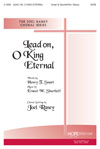- |
User Links
Lead On, O King Eternal
Hymn Information
- First Line
- Lead on, O King eternal
- Author
- Ernest W. Shurtleff (1888, alt. )
- Tune Name
- LANCASHIRE
- Composer
- Henry T. Smart (1836)
- Topic
- Church Year: Christ the King · God's: Majesty · God's: Reign · God: Ways Of · Jesus Christ: King · Justice · Victory · Walk with God
Copyright Information
- Text Copyright
- Public Domain
- Tune Copyright
- Public Domain
- Reprint/Projection Information
- Words and Music: The Words and Music are in the Public Domain; you do not need permission to project or reprint the Words and Music.
Full Text
Scripture References
Thematically related:
- st. 1 =
- st. 2 = ·
- st. 3 =
Further Reflections on Scripture References
Graduation is one milestone on our life's journey, a road sign that points to the future as much as it marks the end of formal education. Consequently, "Lead On, O King Eternal" is a battle call to go forward in Christian service. Initially laced with war imagery, the text moves on to biblical imagery-"deeds of love and mercy"-and concludes with a note of eschatological hope. This message is as urgent today as it was a hundred years ago.
Psalter Hymnal Handbook
Confessions and Statements of Faith References
Further Reflections on Confessions and Statements of Faith References
The confessions of the Reformed Faith are rich in references to the Kingship of Christ. Heidelberg Catechism, Lord’s Days 18 and 19, Questions and Answers 46-52 reflect on the phrase from the Apostles’ Creed: “He ascended to heaven and is seated at the right hand of God.”
Heidelberg Catechism, Lord’s Day 19, Question and Answer 50 professes that “he is head of the church, (and) the one through whom the Father rules all things.”
Our World Belongs to God, paragraph 27 professes that “all authority, glory, and sovereign power are given to him. There he hears our prayers and pleads our cause before the Father.”


 My Starred Hymns
My Starred Hymns






